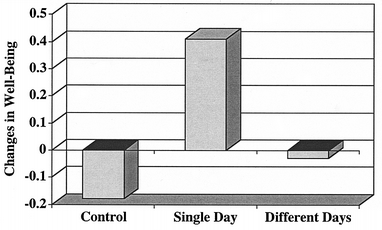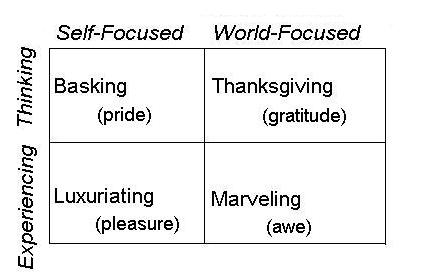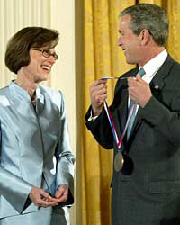Sometimes you think that because you have a thought, that it is the truth. But, often your own thoughts can fool you. How many times have you thought, “Everything is going wrong, and there’s nothing I can do,” and then you come out from that into new great things (and sometimes new bad things). Life changes. Things change. You can’t believe every thought you have – you wouldn’t believe every word that someone else says to you, so why believe every subconscious half-thought of your own head? You can use those thoughts that are productive and useful to move you forward, but if you have negative thoughts that spin in a downward spiral, then it may be that at that point, the ticker tape in your head is on automatic, and that it may be useful to switch it around.
It’s funny that people respond to themselves differently than they would to their friends. I just had a unusual time where I wasn’t sure this was going right, or that was going right, etc. And it just made me so upset at myself to I know that if I were to step aside and if my friend were saying the same things… I know what I would tell her! Isn’t that so often the case – when a friend asks for advice on work, on romance, on school, on organization, on home buying, on exercise, etc., you know exactly what to suggest and recommend, but when it’s your life… so often you don’t know! Why is that? Why doesn’t your “intuition” or other advice-giving center kick in when it’s for you as much as it should when it’s for someone else?
Is it because:
* You don’t want to make a mistake (a mistake in your life is more costly than advice for your friend’s life – because after all that was only advice; in the end, the friend makes the decision herself)?
* You don’t believe the counterarguments when it’s about you?
* You want to feel down and dark for a while?
Those are all valid. But let’s break them down. You don’t want to make a mistake – so what?! So you make a mistake. “Do not fear mistakes, there are none,” says Miles Davis. Everything you go through can make you not go through that same thing later. Everything somehow shapes you.
You don’t believe in counterarguments when it’s about you? Yes, this is an ego thing – not in a bad way! This is just a matter of – like the ticker tape beliefs – thinking that if a thought comes from you, then it maybe doesn’t need to be counterargued. That’s just not true! A million times, I will tell you that this is just not true! Your mood, your latest food, the rain, smells around you, the news that day – everything can affect you, and when you have a thought, it may just be a reaction, and something to say, “Thanks for coming, but you’re not really real.” You can have two thoughts, “this food is good for me” or “this food is bad for me.” And the funny thing is that both viewpoints may be valid. Ice cream can be bad for you, or good for you – simply because deprivation in the long run may not work for your personal body system. Broccoli can be good for you for the vitamins, or can be bad for you if farmed in some certain strange way. Everything is arguable. Including your thoughts.
You may want to feel dark and down for a while? The strange, strange, strange thing is that people who go out and FORCE themselves to have a good time anyway usually make themselves feel better. This is especially true of people that have a good time, or better yet, do something FOR someone. Doing something for another person often immediately makes the first person feel better – Sonja Lyubomirsky and colleagues did a study with a control group, a group that chose one day in a week in which to do act kinds for people, and a group that did something kind everyday. The researchers asked the participants to continue this for six weeks and at the end of the six weeks, the control group had slightly decreased happiness from the start of the study, participants that had done kind things every day were much unchanged (and the researchers postulate that this is because the kind acts were not anything unusual and became habitual for that group), and participants that had done kind things on one day of each week reported significantly increased levels of happiness (i.e. well-being).

And about going out and having a good time, there is a great study about bowling alone: participants that were introverts and did not want to go out bowling were taken out to go bowling with strangers, and they showed markedly increased levels of satisfaction after bowling with strangers than before.
So your own advice-giving center may not kick in naturally for you. Still, it would if you were talking to a friend. From an article on relationship advice:
“For example, take a young couple who goes out for a romantic dinner for the first time after the birth of their first child, but spend the entire evening arguing over silly things, and return home deflated. The woman, whose read plenty of articles on “marriages that deteriorated after the first child’s birthâ€, is panic-stricken and flooded with difficult thoughts of divorce. These thoughts can get so out of hand that she begins planning her visitation arrangements and tries to imagine how she’ll manage raising the child on her own. If a friend would have told her the same thoughts, she would have undoubtedly dismissed them. She would have likely pointed out that it is difficult to be romantic when you don’t sleep more than three hours a night, and when you worry during the meal that the baby might wake up crying and the babysitter won’t be able to calm him down. It is easier for us to encourage others, but when it is happening to us, we have a hard time dealing with the false thoughts. Therefore, it is helpful to treat them as if they were voiced by another person whose principal goal is to make us miserable. At the next stage we must conduct an internal argument with those thoughts, resist them with all our persuasive willpower, and prove to ourselves that they are not grounded in reality.”
So, in short, be a good friend to yourself! Pretend you are your best friend and play! Make up other ideas and explanations for yourself that will let you see the big picture, and that will make you act more productively than stewing in those not-helpful thoughts.
Take-away: Pretend you’re your best friend, and talk to yourself kindly, productively, encouragingly – the way you might to your really good friend!
Source for acts of kindness study: Lyubomirsky, S., Tkach, C., & Sheldon, K. M. (2004). [Pursuing sustained happiness through random acts of kindness and counting one’s blessings: Tests of two six-week interventions]. Unpublished raw data.


